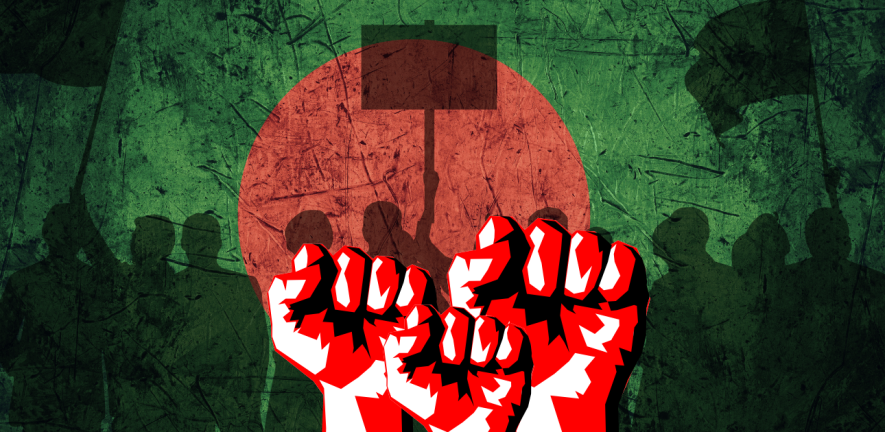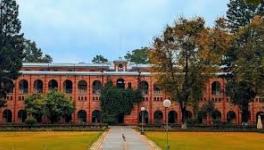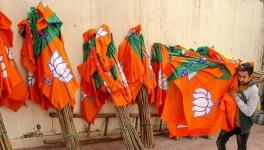Events in Bangladesh Cannot be Viewed Through a Single Lens

Image Credit: The Leaflet
The future of Bangladesh is now a one lakh rupee question. The Sheikh Hasina regime is gone. How much time the interim government, after it is enthroned to power, takes to restore normalcy in the country is a vital question.
What is more significant is the nomination of Nobel laureate economist Mohammad Yunus as the chief adviser to the interim government. His name was suggested by student agitators. A curious matter is if it any interested quarter that has made the students propose his name. This is because attempts were also made in the past to make him the head of the government.
This writer had the fortune of covering the Bangladesh election in January this year. In an interview with a popular television channel in Dhaka on the night of voting, this writer had said that even if an election was held, 60% of the electorate who did not exercise their franchise, remained without a political leadership, and that would pose a big problem for the government that would come to power. In a politically sensitive country like Bangladesh, people without a leadership are akin to weather under severe depression that can cause uncontrolled cyclone.
The Bangladesh Election Commission claimed that the final voting percentage was 40, although according to the Opposition parties, not even 20% votes were cast.
The next afternoon after voting, during the course of a high tea arranged by AK Abdul Momen, External Affairs Minister of the outgoing Bangladesh government, in honour of foreign ambassadors and journalists invited to cover the election, many leaders of the ruling Awami League and several bureaucrats, serving as well as retired, said the comments made by this writer were “fully justified observations”. Hardly eight months after this observation was made, the students came forward to fill the void in the political space for the opposition, and succeeded.
With regard to the future of Bangladesh, what is needed is an in-depth analysis of several vital issues. These are: (i) How did the Hasina government and Awami League bring about such a consequence? (ii) What future awaits Bangladesh? (iii) What would be the Awami League’s future and (iv) What impact will the events in Bangladesh have upon India?
While discussing the terrible situation in Bangladesh, this writer would like to relate a personal experience. During a tour to Dhaka and a few other places around 10 years ago, it was observed that not only the roads, even government offices, market places and academic institutions were virtually covered with graffiti of Sheikh Hasina. Former Prime Minister Khaleda Zia, who remained in office for two terms, or any other leader of her Bangladesh Nationalist Party (BNP) were not visible anywhere.
A few days after that tour, this writer had to face an embarrassing situation in Kolkata. The photo-journalist who I had spoken to in Dhaka about the all-engulfing Hasina imagery in Bangladesh, was in Kolkata to cover the Bangladesh Book Fair. At that time, the fair used to be held on the lawns of Nandan auditorium. As usual, the Bangladesh government pavilion had displayed a huge portrait of Sheikh Hasina. The photographer friend from Bangladesh came to me and complained with much despair, “I'm in deep trouble. I am not able to capture the photograph of our Prime Minister displayed in the backdrop of the stage because photographs of Mamata Banerjee (West Bengal Chief Minister) are all over the place. I may lose my job should I fail to take a photo of our Prime Minister in a frame with the stage in the background”. After speaking to a few familiar officers, I could help my friend from Bangladesh.
Now, back to the issue of Bangladesh. As in the past, to overthrow autocratic rulers, this time, too, a section of Dhaka University teachers was backing the student movement. One of them is Prof Tanzimuddin Khan in the Department of International Relations. He and Nadja Dorschner, who is the Director of Rosa Luxembourg Foundation in New Delhi, together wrote in an article titled ‘Personocracy-- Bangladeshi Style".
They said: " One can view personocracy as a Bangladeshi version of neo-patrimonial governance with a captive electoral system. It denotes a government where the ruler not only has absolute power and assured electoral victory, but also metamorphoses into a system itself, as if to say, “I am the state.” It is more than fascism and, at the same time, more than autocracy. In such a framework, the ruler successfully subordinates all four pillars of democratic governance, including the legislature, executive, judiciary, and the press. The ruler does the same to the party they represent, and the party in turn predominantly symbolizes the person in power.’
During a visit to Dhaka two years ago, I realised that the people of Bangladesh were angry with the government mainly on three issues. First, corruption of epidemical proportion. Second, the skyrocketing prices, and third, harassment of people who were speaking out on the misdeeds of the government by taking police action, including incarceration.
At Dhaka's Karwan Bazar dry fish market, a woman told me that her family was not used to having dry fish, but due to the steep price of fresh fish, eggs, mutton and chicken, they had started buying dry fish. The reason is that with dry fish, one can consume more quantity of rice. Another woman complained that she could not afford to add eggs with noodles for her son’s school tiffin.
One must admit that all these issues afflicting our neighbouring country were not being reported on this side of the border fence. That is because the states on this side of the fence were not comfortable, or were rather “awe-inspired”. Moreover, the characteristics of powerful people who are identified with the term 'personocracy', as described by the Dhaka University professor, are also visible among several politicians of our country.
Corporate executives never give any personal guarantee while marketing their products, but India's present Prime Minister promises “personal guarantee” for government projects. However, we haven't yet used the term 'personocracy' in respect of our Prime Minister or others of his kind. And there lies the difference.
But every aspect has a history of continuity. ‘Maayer Kanna’ (mother's wailing) and ‘Maayer Daak’ (mother's call) are two organisations in Bangladesh, consisting of members of families of persons who have suffered State onslaught and police repression, including ‘secret assassinations’ during the rule of BNP as well as Awami League. Both these organisations have sought foreign intervention in search of justice.
Instances of denial of freedom of speech and violation of human rights become huge in Bangladesh because of that country’s smallness in terms of area as well as population. During Hasina’s regime, two aspects of human rights violations are very important -- complaints of secret killings and the State's invasion of private space.
Cyber security laws had become a cause for sleepless nights in Bangladesh. The US and its allies repeatedly raised questions regarding these matters. But America's divisive policies on human rights, such as keeping mum on violations by the military rulers of Myanmar, emboldened Bangladesh to ignore US protests with ease.
Elections and farce became synonyms in Bangladesh since the country's inception. During the rule of Zia-ur- Rehman and Hussein Muhammad Ershad, elections used to be restricted to Election Commission notifications. Khaleda Zia and Sheikh Hasina also haven't come to power through unblemished elections.
The ascendancy to power by Hasina for five terms, has led to increasing dissatisfaction among the citizens for obvious reasons. That this anger reached such proportions so as to unleash wrath on Gana Bhawan, had escaped the imagination of Sheikh Hasina.
Authoritarian people start losing this realisation after a certain period. Otherwise, Hasina would not have committed such a mistake, especially keeping in mind the history of politics in Bangladesh and her own contribution to it.
Even after Bangladesh’ independence, the nation saw several people's movements, many of which were led by Hasina herself. Was she incapable of sensing the wrath of the people, or did she think she would be able to put down the movement, like on previous occasions, by using the state power?
Sheikh Hasina failed to recognise the mature brains behind the students' movements. Those who failed to dethrone her on their own, or rather, she didn't allow their attempts to succeed, have finally made her flee the country, with their guns on the shoulder of students.
The responsibility for the crisis in Bangladesh lies with the opposition BNP, too. The party's boycott of elections and raising the issue electoral malpractices contributed to leading the country toward anarchy.
What Kind of Future Awaits Bangladesh?
There have been some indications of total anarchy in the aftermath of Hasina's exit. The acts of killings and attacks on religious minorities are testimonies that Islamic fundamentalists are more emboldened.
The BNP, despite its failure play the role of an ideal opposition, has now decided to show their strength by organising a massive rally in Bangladesh. Equally active in the arena is their old ally, Jamaat-e-Islami. Now that the ban on it has been lifted, they will try hard to enforce their religious injunctions and orders. Since 2018, Jamaat had lost registration with the Election Commission under a judicial pronouncement. It's not impossible to restore the registration by enacting a law in this regard.
There are serious apprehensions about who will fill the political void. During Hasina's time, BNP, the main opposition party kept boycotting the election on the plea that it was not allowed to participate in day-to-day political processes. And the way Sheikh Hasina fled the country leaving her party in the lurch may make way for one-party rule in Bangladesh. It is also quite possible that the BNP-Jamaat combine would take over the reins. The apprehension that Bangladesh may adopt Pakistan's constitution cannot be ruled out then.
The new ruler of Bangladesh, Mohammad Yunus, is considered a favourite of the American administration. If Donald Trump comes back to power in November, the arithmetic may change.
Questions also abound about the future plans of Yunus himself. In 2007-2008, he declined to accept the post of the chief adviser to the-then interim government because of the short period of the assignment. Later, he formed a political party intending to become a full-time politician. Now, he has accepted the responsibility to head the interim government. It is quite possible that he may be willing to take responsibility of the country for good.
There is also growing concern among many that the primary US strategy, with Yunus in the foreground and the caretaker government behind, was the depoliticisation of Bangladesh, known as the Minus-Two Formula. It is said that the plan was to remove the country’s two leaders, Khaleda and Hasina, from the political arena by sending them abroad.
Almost all students involved in the anti-quota movement were children or adolescents at that time, so one cannot say how much they have understood the country’s past.
What About the Awami League?
After the assassination of Sheikh Mujibur Rahman in 1975, there was hardly much protest. A march was organised in Pabna by Bangladesh's current President, Mohammad Shahabuddin, for which he was imprisoned for three years. Additionally, some Awami League leaders and activists had planned an attack on the Chattogram radio station, which failed. This incident is known as the Chattogram Conspiracy Case. To make matters worse, several members of Mujib’s cabinet joined the military-supported government of Khondaker Mushtaq Ahmed.
August 15 is India’s Independence Day, but a day of mourning in Bangladesh. The entire month of August is observed as a month of mourning in that country. For many years, Sheikh Hasina, on this day, has expressed regret over the lack of protest from Awami League leaders and ministers after her father's brutal assassination, questioning where they were on that day. She also expressed her sorrow that no one took responsibility for their burial (she was out of the country). The bodies were ultimately buried in extreme neglect by the military.
Sheikh Mujibur Rahman, who spent years in Pakistani jails during his 54-year life and whose leadership led to the deaths of three million Bengalis and the displacement of 10 million people, was a figure against whom the Pakistani administration had prepared all arrangements for execution in Karachi. Given the gravity of these events, it was only natural that the shock of Hasina's departure from the country would have far-reaching consequences. Her escape was unknown even to the top leaders of her party. She did not mention her resignation and departure during a party leaders' meeting the night before leaving the country.
Although Hasina resigned as Prime Minister, she did not relinquish her role as party president. Since 1981, on May 17 every year, the Awami League has celebrated Hasina’s return to her homeland. On that day, she returned to Bangladesh after a long stay in India. Before her return, the Awami League had already elected the daughter of the Father of the Nation as the party president. Upon her return, Hasina revitalised the party and served as the country's Prime Minister for five terms.
For long, there have been questions in Awami League circles about how much Hasina was concerned about the party’s future. However, no one had the courage to bring up this topic for discussions with the leader. The country’s journalists also did not have the courage to raise the issue. In response to questions from foreign journalists, she casually said that the people would choose her successor.
Recent events in Bangladesh suggest that concerns about the Awami League's ability to recover soon are not unfounded. If the interim government starts prosecuting the crimes committed during the previous administration, those Awami League leaders and ministers who had no opportunity to hide, will face imprisonment. To protect their lives and property, they might defect or join another party. Most importantly, given that Hasina left the country in the face of a popular uprising, it is not improbable that the public may turn away from the Awami League for several years.
However, from the killings that Bangladesh has witnessed after Hasina’s exit, the turnaround of Awami League may not be that difficult. The return of BNP in power may not be easy either.
Impact on Bangladesh-India ties
When Hasina left her country, India was Bangladesh’s closest and most trusted neighbour. "Was" because there is considerable doubt about what direction the neighbourly relationship will take in the absence of Hasina.
After Hasina came to power for the second time in 2009, relations with India reached unprecedented heights. She subdued anti-India militants and separatist forces in Bangladesh and maintained a neighbourly approach. As a result, the people of Northeast India have been living in peace compared with a decade and a half ago. However, it is not impossible for Islamic fundamentalism to resurface in Bangladesh now. After Hasina’s exit, the statue of Sheikh Mujibur Rahman, his Dhanmondi house, which was a national museum, and numerous liberation war memorials, were reduced to rubble within a few hours. Minorities are being attacked. The police had anticipated the situation and remained inactive. The army, despite being on the streets, was completely inactive and stood by and watched people loot, destroy statues, and erase liberation war memorials.
Another positive aspect that had emerged between India and Bangladesh was infrastructure exchange. The two countries had started using each other’s roads, ports and waterways. Much would now depend on the perspective the new government of Bangladesh on these issues.
The events unfolding in Bangladesh, therefore, should not be viewed with one lens. There are apprehensions that a strong religio-social organisation has grabbed the opportunity to run the country, keeping the Nobel laureate in front. There is also fear that Pakistani consciousness and Talibani culture may take deep roots in the country as fundamentalist forces gain momentum.
In India, after Afghanistan and Pakistan, now Bangladesh will also become a plank that will give more vigour for those pushing Hindutva. From the reactions of Hindutva forces in social media regarding the recent upheaval in Bangladesh, it is apparent that they are pleased to find a way out to make up for the losses suffered in the recent Lok Sabha elections. Last but not the least, it's surprising that Indian security agencies and advisors failed to anticipate the situation unfolding in Bangladesh.
The writer is Executive Editor, The Wall, and former Senior Editor, Times of India. The views are personal.
Get the latest reports & analysis with people's perspective on Protests, movements & deep analytical videos, discussions of the current affairs in your Telegram app. Subscribe to NewsClick's Telegram channel & get Real-Time updates on stories, as they get published on our website.
























